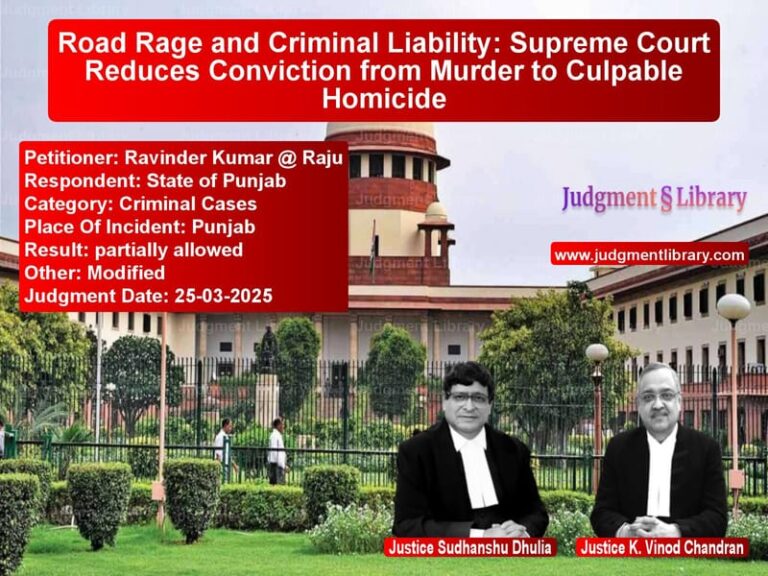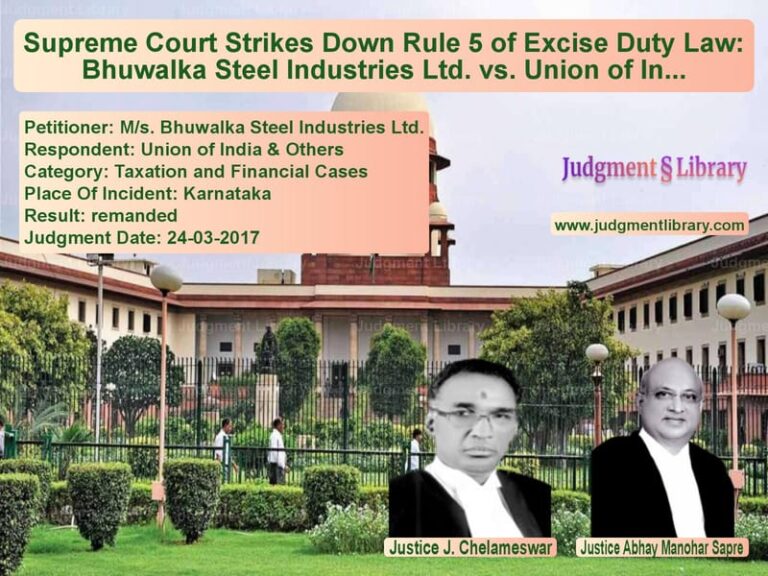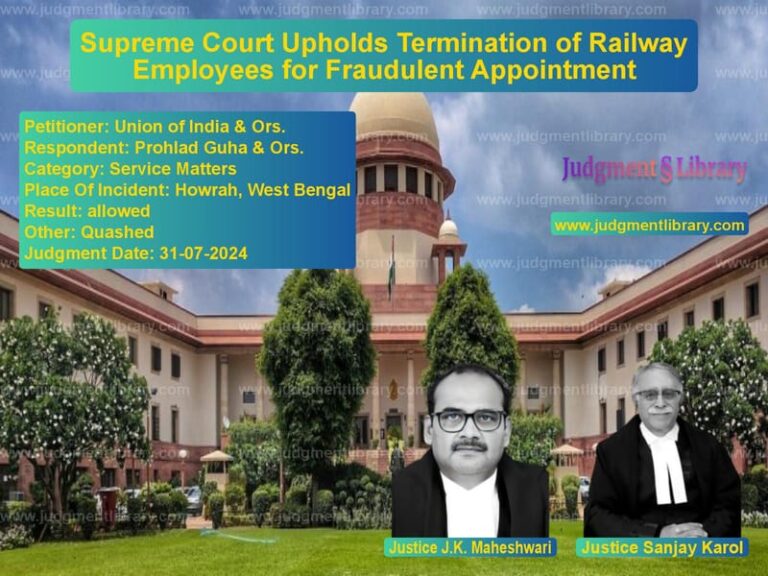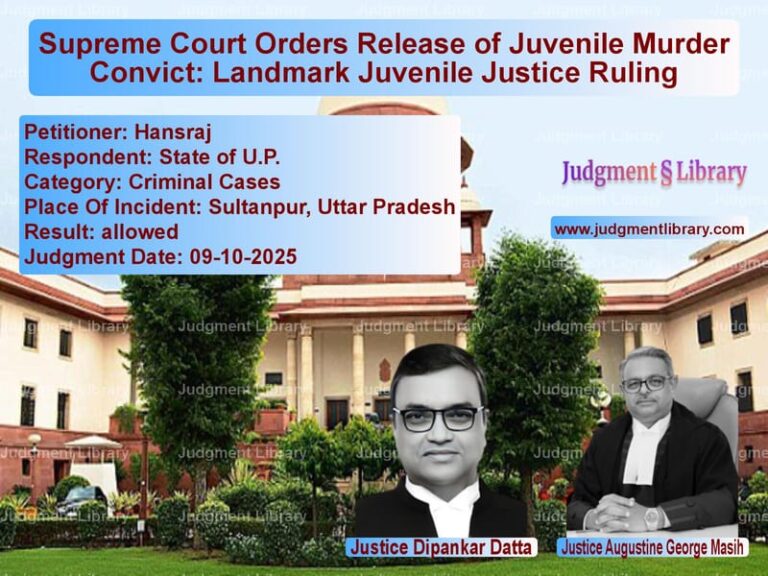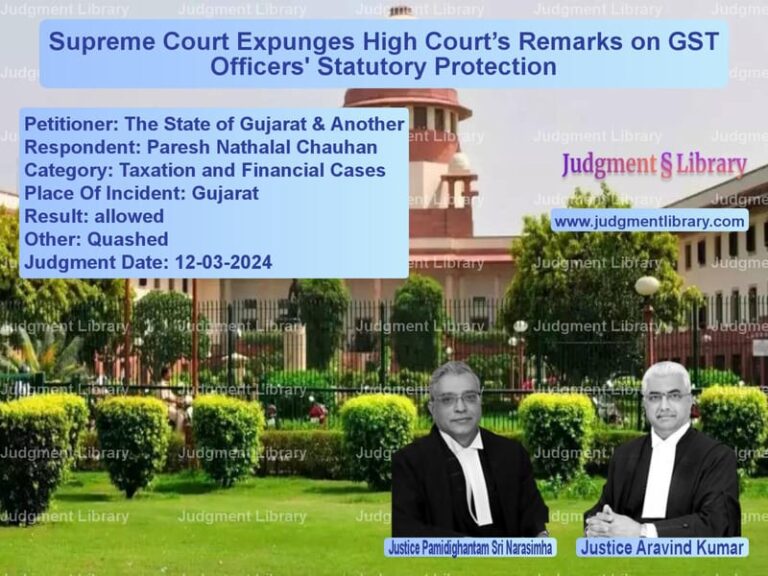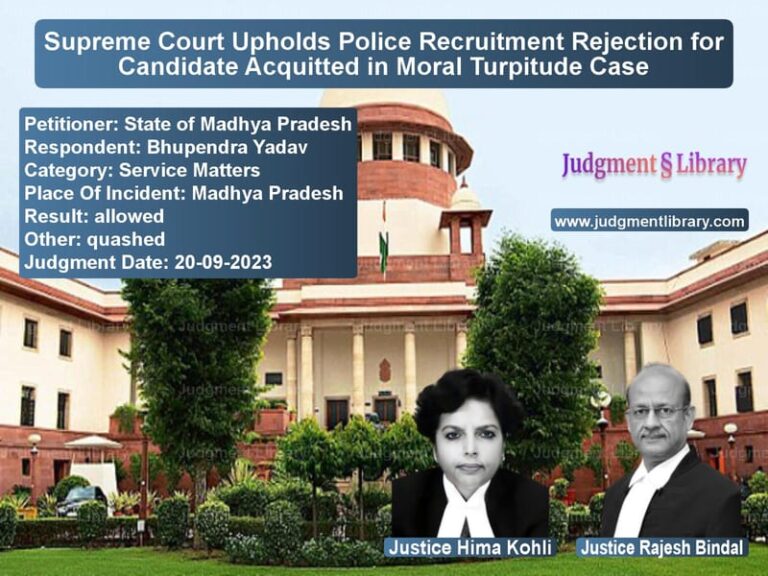Supreme Court Ruling on Child Custody: Legal Rights, Parental Disputes, and Court Directives
The case of Rajiv Vijayasarathy Ratnam vs. Savitha Seetharam revolves around a dispute over the custody of their child, leading to a prolonged legal battle. The Supreme Court of India intervened to resolve interim custody issues while the main case remained pending in the Karnataka High Court.
Child custody disputes often involve complex legal and emotional considerations, requiring the court to balance parental rights with the child’s welfare. This case provides significant insights into how courts handle such disputes, particularly concerning visitation rights, school involvement, financial responsibilities, and litigation limitations imposed on disputing parties.
Background of the Case
The dispute between the appellant (father) and the respondent (mother) began in the Family Court of Bangalore, where an initial custody arrangement was established. Dissatisfied with the Family Court’s decision, the parties approached the Karnataka High Court in C.C.C. No.1236 of 2015. The matter eventually reached the Supreme Court, which issued an order governing temporary custody and other related issues.
Supreme Court’s Key Decisions
While awaiting a final ruling, the Supreme Court outlined several key directives to maintain stability in the child’s life:
- Custody arrangements and exchange point: The Supreme Court upheld the Family Court’s custody ruling but modified the exchange point to Tirumala Tirupati Devasthanam Temple, Melleshwaram, Bangalore. Both parents were required to comply with the designated time of 5:30 PM for picking up and dropping off the child.
- Restrictions on international travel: Neither parent was allowed to take the child outside India without explicit permission from the Karnataka High Court.
- Legal restrictions on further litigation: The Supreme Court barred both parents from initiating new civil or criminal cases against each other, their family members, or the child’s school—National Academy for Learning, Bengaluru—without prior approval from the High Court.
- Financial obligations for school expenses: The school had incurred Rs.1,70,252/- in expenses related to the child’s education and travel. The Court ruled that both parents must share this cost equally.
- Access restrictions to school premises: Due to concerns of interference, the school was given authority to restrict parental access. However, the Principal was required to keep both parents informed of important school events where both could participate.
- Expedited resolution of divorce and pending cases: The Supreme Court ordered that the Family Court expedite the divorce proceedings and dispose of the case within six months. Similarly, other pending legal matters in the 41st Additional City Civil Court, Bangalore (O.S. No.1305/2013) and before the 6th ACMM, Bangalore (CCC No.19847/2012) were to be resolved within the same timeframe.
Petitioner’s Arguments
The petitioner, Rajiv Vijayasarathy Ratnam, argued that:
- The existing custody arrangement was unfair and should be reconsidered to allow him greater access to his child.
- The mother had interfered with his parental rights, causing emotional distress for both him and the child.
- There was a lack of fairness in financial responsibilities, and the burden of school expenses should be equitably distributed.
- The mother’s frequent litigation created unnecessary delays and hardships.
Respondent’s Arguments
The respondent, Savitha Seetharam, countered that:
- The father had previously failed to comply with visitation rules, creating an unstable environment for the child.
- The current custody order was in the child’s best interest and should not be altered.
- The father was attempting to evade financial responsibilities and should be required to share all expenses related to the child’s education and well-being.
- His actions had necessitated previous legal proceedings, and restricting future litigation would be unjust.
Judges’ Observations and Court’s Reasoning
The Supreme Court, comprising Kurian Joseph and Sanjay Kishan Kaul, carefully examined the arguments from both sides and emphasized the need for stability in the child’s life. Key observations included:
1. Best Interest of the Child: “While parental rights are important, the well-being of the child takes precedence. The existing custody arrangement, as determined by the Family Court, should remain in place to prevent unnecessary disruption in the child’s routine.”
2. Need for Litigation Restraint: “It is evident that the ongoing legal battles between the parents have created a toxic environment. We, therefore, deem it necessary to prevent further litigation without permission from the High Court.”
3. Parental Involvement in Education: “The school authorities have raised valid concerns regarding interference from both parents. To ensure a neutral and conducive educational environment, the school is permitted to restrict parental access as necessary while keeping both parents informed of major activities.”
Final Decision and Impact
The Supreme Court dismissed the appeal while providing guidelines to ensure the child’s well-being and parental involvement within legal boundaries. This ruling is significant because it:
- Reinforces the principle that the child’s best interest outweighs parental disputes.
- Establishes legal precedents for custody exchange points, travel restrictions, and parental conduct.
- Sets clear boundaries regarding litigation abuse in family disputes.
Conclusion
This judgment serves as an important reference in family law, illustrating how courts strive to balance the rights of both parents while prioritizing the child’s well-being. It also highlights the judiciary’s proactive approach in expediting legal proceedings and minimizing litigation harassment.
The decision ensures that both parents have access to their child while discouraging prolonged legal battles. The ruling underscores the need for amicable resolutions in custody cases, emphasizing cooperation rather than conflict for the child’s best interests.
Petitioner Name: Rajiv Vijayasarathy Ratnam.Respondent Name: Savitha Seetharam.Judgment By: Justice Kurian Joseph, Justice Sanjay Kishan Kaul.Place Of Incident: Bangalore.Judgment Date: 11-09-2018.
Don’t miss out on the full details! Download the complete judgment in PDF format below and gain valuable insights instantly!
Download Judgment: Rajiv Vijayasarathy vs Savitha Seetharam Supreme Court of India Judgment Dated 11-09-2018.pdf
Direct Downlaod Judgment: Direct downlaod this Judgment
See all petitions in Alimony and Maintenance
See all petitions in Child Custody
See all petitions in Domestic Violence
See all petitions in Judgment by Kurian Joseph
See all petitions in Judgment by Sanjay Kishan Kaul
See all petitions in dismissed
See all petitions in supreme court of India judgments September 2018
See all petitions in 2018 judgments
See all posts in Divorce Cases Category
See all allowed petitions in Divorce Cases Category
See all Dismissed petitions in Divorce Cases Category
See all partially allowed petitions in Divorce Cases Category


